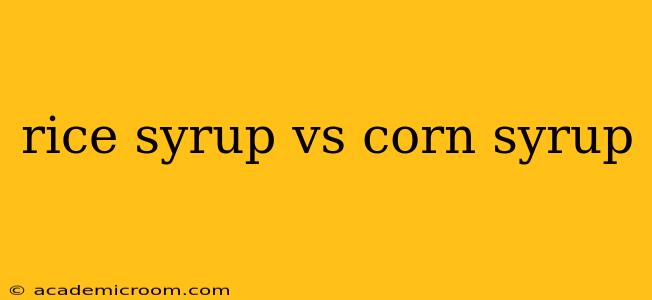Choosing between rice syrup and corn syrup often comes down to individual dietary needs and preferences. Both are sweeteners, but their origins, nutritional profiles, and impacts on health differ significantly. This comprehensive guide will explore the key distinctions between these two popular sweeteners, helping you make an informed decision for your culinary needs.
What is Rice Syrup?
Rice syrup is a sweetener produced from the enzymatic hydrolysis of cooked rice. It's a naturally occurring, light-colored syrup with a mild flavor profile, making it a versatile alternative to other sweeteners. Different types of rice can be used, leading to variations in flavor and texture. Generally, it's considered a healthier option compared to corn syrup due to its lower glycemic index (GI).
What is Corn Syrup?
Corn syrup, often referred to as glucose-fructose syrup or high-fructose corn syrup (HFCS), is derived from cornstarch through enzymatic processing. The process converts cornstarch into glucose and fructose, resulting in a sweeter syrup than glucose alone. HFCS, in particular, has a higher fructose content than regular corn syrup and is widely used in processed foods and beverages due to its cost-effectiveness and sweetness.
Rice Syrup vs. Corn Syrup: A Head-to-Head Comparison
| Feature | Rice Syrup | Corn Syrup (including HFCS) |
|---|---|---|
| Source | Cooked rice | Cornstarch |
| Flavor | Mild, slightly sweet | Sweet, sometimes with a slightly corn-like taste |
| Texture | Varies slightly depending on the rice type | Thin and watery |
| Glycemic Index | Lower | Higher |
| Processing | Generally less processed | More processed, often involving chemical changes |
| Fructose Content | Lower | Higher (especially in HFCS) |
What are the health implications of using each sweetener?
This is a crucial consideration. While both are sources of added sugar, their impact on health can differ.
Rice Syrup and Health:
Rice syrup has a lower glycemic index than corn syrup, meaning it causes a slower and less dramatic rise in blood sugar levels. This makes it a potentially better choice for individuals with diabetes or those trying to manage their blood sugar. However, it is still a source of added sugar, so moderation is key. Excessive consumption can contribute to weight gain and other health problems.
Corn Syrup and Health:
The higher fructose content in corn syrup, especially HFCS, is a subject of ongoing research. Some studies suggest a correlation between high fructose consumption and an increased risk of metabolic syndrome, non-alcoholic fatty liver disease, and other health issues. However, it's important to note that these correlations are complex and don't necessarily imply direct causation. The excessive consumption of any added sugar, regardless of the source, contributes to these risks.
What are the different types of rice syrup?
The type of rice used influences the final product. You'll find brown rice syrup and white rice syrup, each with slightly different flavor profiles and nutritional content. Brown rice syrup tends to have a slightly more robust flavor and richer color.
Is corn syrup healthier than rice syrup?
No, generally, rice syrup is considered the healthier option due to its lower glycemic index and generally less processed nature. However, both are added sugars and should be consumed in moderation as part of a balanced diet.
Which sweetener is better for baking?
Both rice syrup and corn syrup can be used in baking, though rice syrup's milder flavor might be preferred in recipes where you want the other ingredients to shine. Corn syrup's higher sweetness might require adjustments in other ingredients' quantities. Experimentation is key!
Which sweetener is better for cooking?
Similar to baking, both can be used in cooking. Rice syrup's milder flavor makes it suitable for sauces and glazes where you don't want a strong corn flavor.
In conclusion, while both rice syrup and corn syrup serve as sweeteners, rice syrup often emerges as the slightly healthier option due to its lower glycemic index and less processed nature. However, moderation is key for both, as excessive consumption of any added sugar can negatively impact health. The best choice ultimately depends on individual dietary needs, preferences, and the specific application in cooking or baking.
